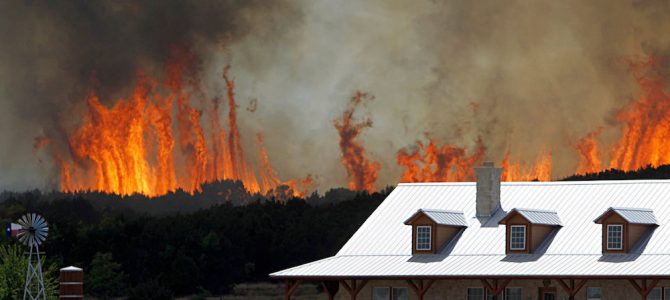
“The flames were forty, fifty feet high, traveling at 80 to 90 miles an hour.”
Recent wildfires have seared millions of acres, leaving a swath of total devastation across Kansas, Oklahoma, Colorado, and Texas. The memories will haunt residents for generations. The thousands of dead cattle, their carcasses swelled even in the cool weather of spring, leave a smell that will linger in memory of anyone who has experienced it.
Seven people were killed in the fire, trapped by the fierce and swirling winds. One family survived by running from their home to a large wheat field, the green wheat serving as a fire break, as they watched their home burn and their ranch die. It is hard to imagine their feeling of isolation, of helplessness, of smallness, as they huddled in that field, surrounded by fire and smoke, watching an inferno on the plains.
We All Feel Helpless After Natural Disasters Strike
“She’s out shooting cows.”
I’m listening to Kansas Sen. Pat Roberts, who is not known for public displays of emotion. But his voice chokes a little as he tells us about a conversation with a Kansas friend. His friend’s wife was absent because she was at home doing what is hard, but what is also an act of kindness and mercy, as she dealt with cattle mortally injured by the recent Kansas wildfires.
Cattlemen live to protect the animals in their care. The feeling of failure when disaster strikes is profound and it is devastating. As I visit with my Kansas friends, and their stories are repeated across Oklahoma, Texas, and Colorado, I’m told of a wall of flames traveling at interstate speeds and leaving devastation and heartbreak in its wake. Of all the emotions we humans endure, surely none is worse than helplessness in the face of tragedy.
This is a human tragedy, as lives were lost and businesses ruined. It’s an environmental challenge, as millions of acres lie unprotected from spring weather. It’s a generational loss, as the cattle that perished were the results of decades of careful breeding and those bloodlines won’t be replaced in our lifetimes. And it’s an economic tragedy of Katrina-like proportions, as farmers and ranchers struggle to replace a lifetime of work. Some farmers lost 100 miles of fence, which will be replaced at a cost of $10,000 per mile. These losses will not be covered by insurance.
Why Does The Media Ignore Flyover Country’s Plight?
The New York Times ran a story; the major networks covered the fires; and regional newspapers have offered extensive coverage of the fires. But the ranchers affected are more than a little offended that their tragedy, their story, has triggered so little interest in the rest of the country. Later stories have a global warming angle, with the subtext that those Trump voters are reaping what they have sown.
Locals aren’t much interested in speculation about sin and retribution, crediting the fires to a remarkably cool and wet summer last year which lead to more than normal growth of grass and a consequently large supply of flammable material to feed the fires. Despite the lack of bicoastal interest, or maybe because of it, the response from fellow farmers and ranchers across the great middle of the country has been astonishing and heartwarming.
My social media feed is full of pictures of convoys of trucks headed toward the plains. Farmers are purchasing fencing materials and loading trucks for Kansas and points west. My neighbors are collecting items to deliver this week, and one of my friends has already made two trips west. Orphan calves are being adopted by 4-H clubs; the kids will bottle feed the calves until they are large enough to be returned to their home ranches. Farm organizations, churches, and civic clubs are raising money, purchasing replacement items, and doing what they can to help their fellow farmers and ranchers recover. It is the most moving example of private action that people here have seen, and as far as we residents of flyover country can tell, the rest of the country is totally unaware.
This Displays The Best Of What It Means To Be Human
It would occur to a cynic, and I have to admit that cynicism is hard to maintain in the face of an outpouring of generosity of this magnitude, that this isn’t a well-covered story because it runs against the narrative that has become prevalent since last year’s election. What we hear from the victims isn’t bitterness, but gratitude for the kindness of farmers elsewhere. There is no opioid angle and no way to paint anybody involved as exhibiting anything but the very best of what it is to be human.
If you are convinced that the election results came about because of the anger, bigotry, and downright cussedness of middle-aged white males, pictures of beefy guys driving big rigs for hours to help people they don’t even know really screws up your worldview. My neighbors don’t expect that this narrative will be changed anytime soon, and I expect that they are right.








